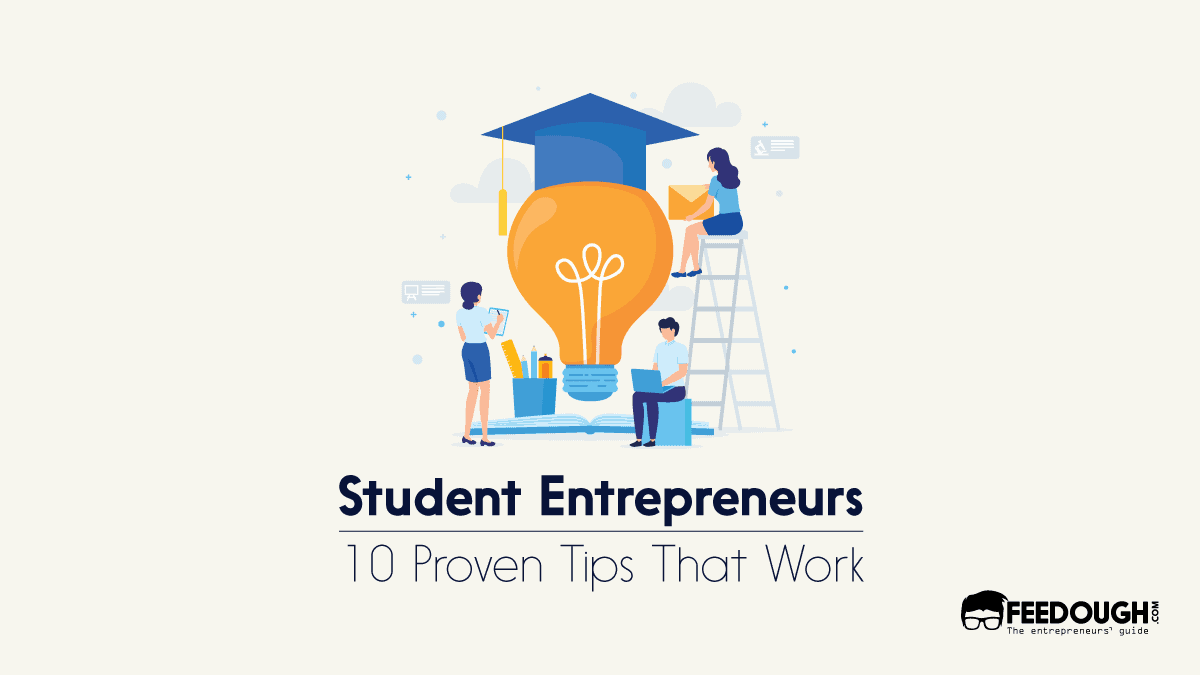Entrepreneurship is a buzzword in the modern world. And its power to attract is particularly strong for the ambitious and innovative minds of students who wish to become entrepreneurs.
As the academic landscape expands and embraces creativity and risk-taking, more and more students are getting lured into the world of startups while continuing their studies.
However, for new minds, navigating the path of a student entrepreneur can be both thrilling and challenging. So, to contribute to your aspiring young vision and help you make your entrepreneurial journey easier, we are here with ten proven tips tailored explicitly for student entrepreneurs.
These practical insights are not just general tips but actionable points drawn from the experiences of successful entrepreneurs who once stood in the same shoes. If you are a student with an entrepreneurial spark, take heed of the valuable guidance and strategies and turn your ideas into reality.
Develop A Product That Solves A Real Problem
If you want to develop a product that addresses a real problem, there are two approaches you should consider when figuring out your product or service. These are:
- Relevance to the pain point, and
- Having a unique approach.
Relevance To Pain Points
As you are just starting as a student entrepreneur, you need to identify and understand customers’ pain points or unmet needs in a specific market.
Consider:
- Conducting thorough market research. You can do this on your college campus, where students have different, creative minds to get diverse ideas.
- Engaging in conversations with potential customers or students, professors, and business enthusiasts around you to get different approaches to an idea.
- Gather insights about what challenges your peers face in their daily lives that are frustrating and require an immediate solution. This will give you new challenges to set up your business around.
By converging with people, you can tailor your product to address their pain points directly.
A relevant product is one that:
- Seamlessly integrates into your customers’ lives
- Provides a solution that resonates with their needs
- Simplifies their daily tasks
- Saves them time and effort
- Offers a tangible benefit that enhances their overall experience.
The more relevant your product is to their lives or businesses, the higher the chances of gaining loyal customers who value its impact.
For instance:
- AI chatbots solve the problem of writers, students, or researchers getting relevant and accurate answers to their complex or research-intensive queries within a few minutes.
- Netflix solves the problem of limited entertainment options, like going to the cinema, inconvenient schedules of traditional media, and more.
Unique Approach
In a competitive market, where N number of products are shelved, you’ll be recognised differently and capture the attention of your target audience when you offer them a better solution to make their lives easier.
To be unique, identify what can make your product different, unique, or superior. It could be:
- A novel technology
- A fresh and unique perspective on an existing problem’s solution
- A user-centric design approach to a solution
- An innovative business model
You can emphasise these unique aspects in your marketing efforts and highlight your product’s distinctive value proposition in the market, even if it makes the smallest difference.
For example, consider creating a note-sharing platform where students can buy and sell their personal notes, and teachers can upload their resources for all the students on one centralised platform. By eliminating the manual collection of notes, students and professors can provide each other with a comprehensive repository of study materials at the touch of a button and save time.
This unique approach of making notes available online attracts students (your potential customers) and fosters a sense of exclusivity. This makes your customers feel they have access to something special that cannot be easily replicated.
By combining relevance and uniqueness, create a product that addresses pain points and captures the market’s attention.
Study Your Competitors & Industry Leaders
As a student entrepreneur, one of the crucial steps to building a successful startup is studying your competitors and industry leaders. Before you get started, study the startups of others around you to get a better idea of what sets them apart from other startup endeavours. This practice will play an essential role in strategising your startup’s plan. By studying them, you can:
Gain valuable insights and opportunities that you can leverage at the nascent stage of your venture.
Identify how they covered gaps in the market to strategies to cover gaps and differentiate your product or service.
- Understand their offerings and shortcomings to discover new avenues for innovation for your startups.
- Learn from their successes and mistakes, adopt the best practices and avoid the pitfalls they faced as a new student entrepreneur.
- Stay updated on the latest developments and trends in your field to boost your startup’s growth and relevance.
- Access critical market intelligence and tested strategies that will fuel your strategic decisions.
- Benchmark your startup’s performance against the competition, set realistic goals, and track your progress.
- Gain valuable insights into consumer preferences, pain points, and expectations by analysing your competitors’ customer base. Using these insights, you can refine your product or service to meet customer needs better.
- Study competitors’ pricing and positioning strategies to set a pricing strategy and market positioning for your newly launched products.
For example,
Studying competitors and industry leaders is not about copying their strategies but about learning from their entire journey. As analysing them will give you actionable valuable insights into dos and don’ts as a student entrepreneur, you can drive the growth and success of your startup.
Keep It Simple
As a student entrepreneur, embracing simplicity can be a powerful tool for success in the dynamic startup world. Where 1,37,000 startups emerge every day globally, and 90% of them fail, 34% of those fail due to the lack of the proper product-market fit, which can often be a result of product complexity.
Thus, to achieve simplicity, you need to find the right balance between the known and the unknown solutions available in the market. This means you neither solely rely on existing methods (Tracers) nor continuously pursue creating novel methods (Re-inventors). As a new entrepreneur, you must integrate both new and old approaches to create a simple yet innovative and reliable solution to keep things straightforward.
- Tracers are content with the existing solutions and tend to adopt and replicate the existing methods to resolve problems.
- Re-inventors are the innovators of the industries who continually explore novel methods for every challenge and set new trends.
So, as an entrepreneur who’s just starting out, be a balancer who takes inspiration from proven strategies while having a unique idea and approach to the solutions. Maintain an equilibrium to enhance and improve these concepts and make them uniquely yours.
For example: Airbnb
Airbnb was the idea of three student entrepreneurs who were roommates in San Francisco. They came up with the idea of renting out their living space to people who were attending a design conference in the city. They put together a website called Airbedandbreakfast.com, and the service quickly took off.
Airbnb has since grown into a global company with over 4 million listings in over 220 countries. It has changed how people find a place to stay when they travel. Instead of only booking hotels (Tracers), Airbnb lets regular people rent out their homes to travellers. This idea is easy to understand and use, but it’s also very different from traditional hotels, which makes it new and exciting (Re-inventors).
Airbnb got its success when it started to offer its services with a perfect balance between the old concept and introducing a new one. By providing unique travel experiences and making booking a place to stay easy, Airbnb won people’s trust and succeeded.
Proper Time & Finance Management
Proper time and finance management are crucial for student entrepreneurs, as both are in short supply. You must efficiently balance your academic commitments with your entrepreneurial pursuits and your business’s budget with your daily expenses. Here’s how you must do it:
Student Entrepreneur Tips For Time Management
- Make a schedule: Take a pen and paper, and write down your daily or weekly schedule. Write down the time you will dedicate to academic tasks, including classes, library time, the time you give to projects and more. Then, write your startup work timing where you’ll work solely to upscale your startup. In this schedule, prioritise essential tasks and allocate specific time slots for each activity.
- Set realistic goals: Define clear and achievable goals for your studies and startup. Do not get too extensive or unrealistic with your goals. While it is possible to complete the syllabus one night before the exam, this kind of goal will not work for your startup. So, break down the larger tasks into smaller, manageable steps to make achieving everyday goals less overwhelming.
- Block your time: To work on your startup, block specific dedicated hours for these tasks. In these hours, avoid multitasking as it will affect productivity and efficiency, and just focus on the startup.
- Identify time-waster tasks: There are many tasks that, without reason, suck up time. You need to identify these time wasters and eliminate this time to redirect it to do something more valuable.
- Take breaks: Taking short breaks is essential to avoid burnout. At first, you might enjoy working and studying without breaks, but eventually, it will take a toll on you and give you burnout. Make time for short gigs with friends in your schedules.
Student Entrepreneur Tips For Finance Management
- Track expenses: Keep a record of all your startup and personal costs. You can use tools or apps to keep scanned copies of bills to organise and track your spending. This will help you maintain a clear picture of finances and also help you claim the expenses as a startup.
- Budget wisely: As a student entrepreneur, you need to create a budget to avoid overspending. You can outline your revenue sources and planned expenses. When you have a budget, stick to it strictly to prevent overspending and financial strain, as finances are already limited when you are a student.
- Separate finances: Always open a separate bank account for your startup to maintain clear financial separation from personal funds. With this, you will be able to track business expenses more effectively.
- Seek professional advice: As a newbie in the realm of startups, consider consulting with financial advisors, professors, researchers, or HODs of finance departments who can provide genuine guidance on financial matters specific to your startup.
- Look for cost-effective solutions: There are always cost-effective ways to run your startup without compromising quality. For instance, consider using free or low-cost tools for marketing and communication tasks, and work with freelancers, friends, and juniors who are ready to work at lower costs instead of hiring people.
Build A Network
Building a strong network is a critical aspect of success for student entrepreneurs. A well-established network can provide valuable resources, support, and opportunities for your startup. When you are surrounded by so many people of different ages, professions, and experiences, networking becomes way easier.
Here’s how to build and nurture a thriving network:
- Engage with your college community: Connect with faculty members, students, and alumni interested in entrepreneurship. Attend workshops and events.
- Join entrepreneurship clubs: Become a part of campus clubs focusing on entrepreneurship. In clubs, meeting like-minded people will help you in networking and collaboration.
- Leverage social media: Use platforms like LinkedIn and Twitter to connect and engage with industry influencers and experts.
- Collaborate with Startups: Partner with other student startups to get mutual benefits and innovative solutions.
- Pitch in competitions and hackathons: Take part in relevant hackathons or competitions to showcase your startup to potential investors and stakeholders.
- Join online entrepreneurship communities: With the rising trend of communities, there are many forums and groups you can choose to join to connect with entrepreneurs globally. You can also join such relevant groups in colleges and universities.
- Stay active locally: To build a local presence, attend local startup events, and join co-working spaces and incubators to network in your area.
- Follow up and nurture relationships: Building a network is not just about making connections. It will help if you nurture those relationships over time. To do so, follow up with people you meet, express genuine interest in their ventures, be a part of their daily events, and offer support when needed.
Build A Team
As the saying goes, “Together, we are stronger than the sum of our parts,” this perfectly underscores the importance of building a team as a student entrepreneur. This is because, no matter how many endless hours and efforts you pour in or as much as you may possess skills and drive, you cannot be a one-man army to tackle all aspects of your startup. A team always has better results.
Here’s how to build an effective team:
- Look for team members with diverse skills to complement yours. These people can be your friends, mutual connections, juniors, or peers in communities. A diverse team always helps you get a broader range of perspectives on the table.
- Ensure your team members share the same vision and values for the startup. You can always find like-minded people in your relevant subject class, competitions, or seminars. People with a unified sense of purpose help the team work cohesively towards common goals.
- Seek members who are passionate about your startup’s mission and are not just passing the time as a student to get some co-curricular activity. A passionate team is more likely to stay committed, even during challenging times. And challenges are a part of your way as a startup.
- Always foster open and transparent communication within the team and clearly define what you can provide them with. Encourage feedback and idea-sharing to create a culture of collaboration. Transparency is the best policy to get a loyal team.
- Look for team members who are flexible and adaptable to the dynamic nature of startups, as startup environments require individuals who can quickly pivot and adjust.
Moreover, always remember that building a team is not just about finding a suitable skill set. It is also about finding people who align with your startup’s vision and values. A supportive team can help you:
- Accelerate your startup’s growth
- Navigate challenges effectively
- Achieve greater success
Go For The Market Validation (Minimum Viable Product Testing)
Market validation, also known as Minimum Viable Product (MVP) testing, is a crucial and a must-take step for student entrepreneurs. Because if your product has no relevance to the market’s needs, what use is there in creating the product in the first place?
This process aims to test your startup idea or product in the market before you fully launch it. This testing will help you gauge people’s reactions and gather feedback and data from potential customers. This data allows you to validate whether your concept has actual demand in the market and potential for success.
You can offer your product to the entire college student body, professors, and their mutuals. It will keep the product in a closed group, serve the purpose of conducting the MVP test and also help you gain rational feedback.
Instead of spending a significant amount of time and hefty resources to build a full-fledged product, start with a basic version known as the Minimum Viable Product (MVP). The MVP product has the core features necessary to address your target audience’s primary problem or need. Release this version to see the customer response and identify areas for improvement.
For example, Buffer
A social media management tool, Buffer allows users to schedule posts, analyse performance, and manage multiple accounts. Joel Gascoigne, the founder of Buffer, started with a simple landing page explaining the product’s value proposition and asked visitors to sign up for a paid plan.
He used this MVP to test whether people would pay for his idea before building the product.
Be Ready To Adapt
Adaptability is one of the most crucial parts of starting a new business. You can not stay in the same place, repeating the same strategies, plans and tasks you began with. Your startups run the risk of getting caught in a vicious cycle with no advancement and being susceptible to collapse. In contrast, your growth spirals upward when you adapt to different required changes over time.
In the same way a student needs to adapt to different syllabi and semesters, you need to adapt different strategies at different stages to make your business successful.
Here are the things you need to be adaptable with:
- Rapid Market Shifts: Markets are dynamic, and consumers’ preferences rapidly evolve with their needs based on their lifecycle changes and other events. Being adaptable allows you to respond quickly to shifts in market demand and adjust your products or services accordingly. Like
,grocery stores that adopted home deliveries during the time of covid saw a boom in that and the post-pandemic period. - Advancements In Technology: Technology is getting more accurate, efficient, precise, and powerful every day, and it also plays a significant role in today’s business environment. Embracing new technologies and trends can give your startup a competitive edge. Similar to how many of your fellows graduated online, thanks to technology.
- Customer Feedback: Listening to customer feedback and being open to suggestions helps you improve your offerings and cater to their evolving needs. For example, if the university student Phil Knight, and his coach Bill Bowerman, the founders of Nike, wouldn’t focus on customer feedback, they wouldn’t have been able to make it a billion-dollar company.
- Accept Competitive Challenges: Everyone offering solutions to users, including your competitors, might develop innovative solutions. Being adaptable allows you to stay ahead by learning from them or finding creative ways to differentiate your startup.
- Regulatory Changes: With your startup evolving and having new customers on board, the existing regulations and policies can impact your business. Always stay prepared to adapt to new rules as required, as this will ensure compliance and minimise potential disruptions.
- Economic Shifts: Economic conditions never stay the same. They fluctuate. Be adaptable to adjust your strategies to thrive in both booms and downturns.
- Internal Growth: Your needs and challenges will evolve as your startup grows. You might need more professionals, student interns, strategy changes, or other changes. Being flexible allows you to scale your team and operations effectively.
When you embrace adaptability:
- You foster a culture of continuous learning
- You encourage yourself and the team to explore new possibilities and acquire new skills.
- It builds resilience that helps you overcome obstacles and bounce back stronger from setbacks.
Take Part In Student Entrepreneurship Competitions
Student entrepreneur competitions do not just host a competition but also offer a host of benefits that can significantly impact your startup’s success.
These competitions give you push and impact you because it offers:
- Funding opportunities: Many competitors provide prize money to the winners, which you can use to fund the development or launch of a business.
- Publicity and networking: When you compete, you already put your startup in the spotlight, which attracts the attention of investors, professors of your college, mentors, and potential customers. This also gives you an advantage in your college campus.
- Feedback and validation: Competing in a gig helps you get valuable feedback from experts and judges. This feedback can help you refine your business model and validate your ideas at the very nascent stage.
- Collaborating and learning from peers: Interacting with other student entrepreneurs gives you exposure to diverse perspectives and ideas, fostering a collaborative learning environment.
- Networking Opportunities: Engaging with fellow competitors, judges, researchers from different colleges, and sponsors expands your network, which helps you create potential partnerships and future opportunities.
Seek Mentorship and Guidance
Every time someone starts on a journey, be it a startup, a hiking experience, cooking, learning a new skill, or beginning with any other journey, they always need the guidance of the experienced.
The insights and expertise of mentors, professors, and seniors who have been in your place as a student entrepreneur will help you find the right direction at ground level through the complex world of student entrepreneurship.
Here’s is more that you can get from the mentor’s guidance:
- Gain experienced insights and expertise from experts who have been student entrepreneurs in their age, professors, or other experts who have been through the entrepreneurial journey.
- Avoid the common pitfalls they have fallen in with the guidance and tested strategies they provide.
- Expand your network and access potential investors, partners, and customers through your mentor’s connections.
- Receive support, encouragement for personal growth and constructive feedback during challenging times to refine your ideas and decision-making process.
- Draw inspiration from your alumni student entrepreneurs’ success and experience.
- Accelerate your learning curve and propel your startup towards success through mentorship.
Wrapping Up
As you journey into the world of student entrepreneurship, all equipped with these ten proven tips, remember that greatness lies ahead. You possess the ambition, creativity, and determination to turn your dreams into reality.
Stay calm, embrace the challenges, and enjoy this thrill-filled journey to create something meaningful from scratch. Never hesitate to seek guidance from experienced mentors, connect with like-minded individuals, and learn and adapt along the way.
Your journey as a student entrepreneur has only just begun, and the possibilities are limitless. Let your vision soar high, and remember, greatness lies within you.
FAQs
Student entrepreneurs are higher education registered students actively engaged in academic studies and running their own startup or business venture.
Yes, solo founders do attract investors. A study shown by Forbes says that “45.9% of companies that raised more than $10 million were also solopreneur companies.”
Student entrepreneurs can access a wealth of support from universities to fuel their startup ventures. Universities like St. Cloud State University, Stanford University, Massachusetts Institute of Technology and many others offer workshops, mentorship programs, guidance from experienced faculty members, and opportunities to participate in entrepreneurship competitions. These resources empower students to transform their innovative ideas into successful businesses while pursuing their academic goals.
It depends on your strengths and weaknesses. If you are an individualist who prefers working alone, you must stay a solo founder. But if you are a collaborator, you can choose to have a co-founder. A co-founder can bring complementary skills and support, but solo entrepreneurship is also possible with discipline and focus.
You can possibly balance academics and entrepreneurship with proper time management, discipline, and support from mentors or advisors.
A startup consultant, digital marketer, traveller, and philomath. Aashish has worked with over 20 startups and successfully helped them ideate, raise money, and succeed. When not working, he can be found hiking, camping, and stargazing.









